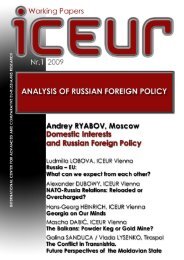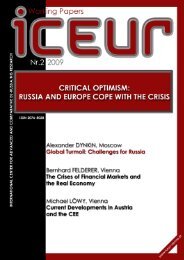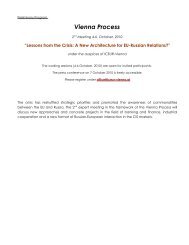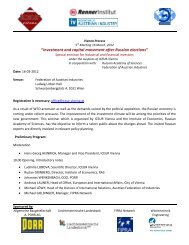EU-Russia: New Departures and Old Habits - ICEUR-Vienna
EU-Russia: New Departures and Old Habits - ICEUR-Vienna
EU-Russia: New Departures and Old Habits - ICEUR-Vienna
You also want an ePaper? Increase the reach of your titles
YUMPU automatically turns print PDFs into web optimized ePapers that Google loves.
Mark ENTIN<br />
Mark ENTIN<br />
Professor, Director of the Institute of European Law, MGIMO<br />
Ministry of Foreign Affairs of the <strong>Russia</strong>n Federation<br />
Future tasks for the development of the relations<br />
between <strong>Russia</strong> <strong>and</strong> the European Union<br />
At the press conference at the <strong>EU</strong>-<strong>Russia</strong> Summit in Rostov-on-Don on 1 June 2010, the President of the<br />
European Council, Herman Van Rompuy, addressed the <strong>Russia</strong>n government <strong>and</strong> the <strong>Russia</strong>n people with<br />
positive, warm, kind <strong>and</strong> promising words, words that were “pleasant in every respect”. He said: “To<br />
conclude: <strong>Russia</strong> is a real strategic partner to the <strong>EU</strong>. With you we have a most intensive <strong>and</strong> dynamic<br />
1<br />
dialogue. With <strong>Russia</strong> we do not need a “reset”. We want a “fast forward” . The President of the European<br />
Council acted against his conscience. He really did.<br />
Relations between <strong>Russia</strong> <strong>and</strong> the <strong>EU</strong> are in a disgraceful condition at the moment. With their small-minded,<br />
greedy <strong>and</strong> short-sighted policy, contradicting itself <strong>and</strong> the objective interests of global development,<br />
Moscow <strong>and</strong> Brussels not only inflicted a tremendous damage to each other, but to all the people on the<br />
continent. What this policy needs really urgently is a complete reorganisation, or rather a “comprehensive<br />
system modernisation”. It is of vital importance to promote new <strong>and</strong> unconventional ideas <strong>and</strong> to work hard<br />
in order to consolidate them within the public consciousness. We need to jointly proclaim ambitious<br />
strategic goals, the achievement of which could really change our continent. And it is not enough to only talk<br />
about them, using empty words in which nobody believes – we have to concentrate all available powers in<br />
order to make them our common perspective for the future.<br />
The construction of a Greater Europe without border lines or – to put it in a more emotional way, the Union of<br />
Europe – could become such a political project. The Council of Europe has been doomed to work on specific<br />
humanitarian aspects of this project for many years now, without any significant chances of success. This<br />
political institution is being kept on a “starvation diet” <strong>and</strong> is being pushed further <strong>and</strong> further to the<br />
periphery of political life. Its further existence depends on the goodwill of <strong>Russia</strong> <strong>and</strong> the European Union.<br />
An economic <strong>and</strong> political reconstruction of the continent, based on the so much proclaimed <strong>and</strong> promoted<br />
principles – this is what today's Europe really needs to be saved. A reconstruction, similar to the formation of<br />
partnership relations <strong>and</strong> corresponding to the nature of their political culture, the common market, national<br />
law <strong>and</strong> its harmonisation, effective institutions for cooperation, partnership <strong>and</strong> administration. A<br />
reconstruction, eventually leading to the emergence of a Union which would absorb all people of the region.<br />
Now, with a delay of 20 years, it is high time to overcome the division of Europe within the above-stated<br />
spheres, within the sphere of internal <strong>and</strong> external security as well as in all other spheres that constitute <strong>and</strong><br />
determine the life of modern society.<br />
HISTORICAL INJUSTICE<br />
<strong>Russia</strong> has sacrificed quite a lot on the altar of freedom, on the altar of unification <strong>and</strong> reconciliation between<br />
East <strong>and</strong> West. In fact, <strong>Russia</strong> has sacrificed itself <strong>and</strong> everything it used to possess – its past, its present <strong>and</strong><br />
its future.<br />
In the late 1980s <strong>and</strong> early 1990s, after it had “forced out the slave from within”, <strong>Russia</strong> spared no effort to<br />
put an end to communism <strong>and</strong> totalitarianism. By liquidating one of the conflicting parties, it liquidated the<br />
threat of mutual nuclear destruction <strong>and</strong> put an end to the Cold War. In fact, <strong>Russia</strong> brought “salvation” to all<br />
the people of the planet. It brought them hope for a new, peaceful <strong>and</strong> happy life.<br />
It was not <strong>Russia</strong>'s fault that these hopes did not become reality. Only now, as everything around is<br />
1 English original text: http://www.consilium.europa.eu/uedocs/cms_data/docs/pressdata/en/ec/114736.pdf; <strong>Russia</strong>n source<br />
from the Website of the President of the <strong>Russia</strong>n Federation: http://news.kremlin.ru/transcripts/7932/print<br />
IC<strong>EU</strong>R-<strong>Vienna</strong> Working Papers 3|2010 4









